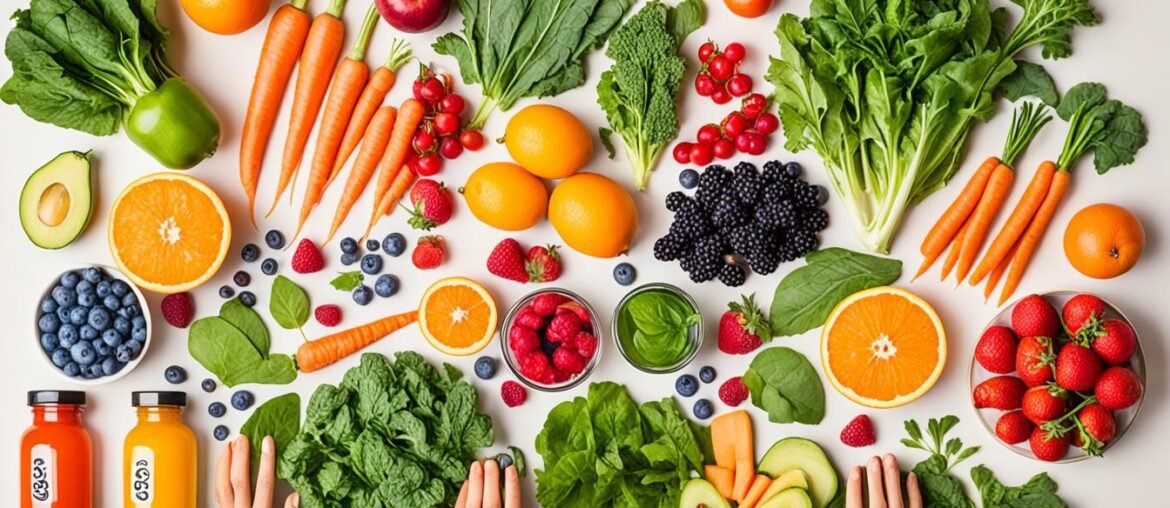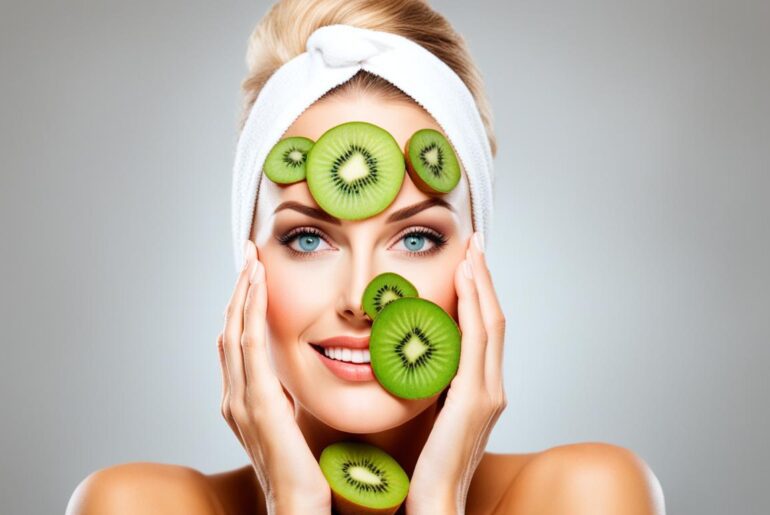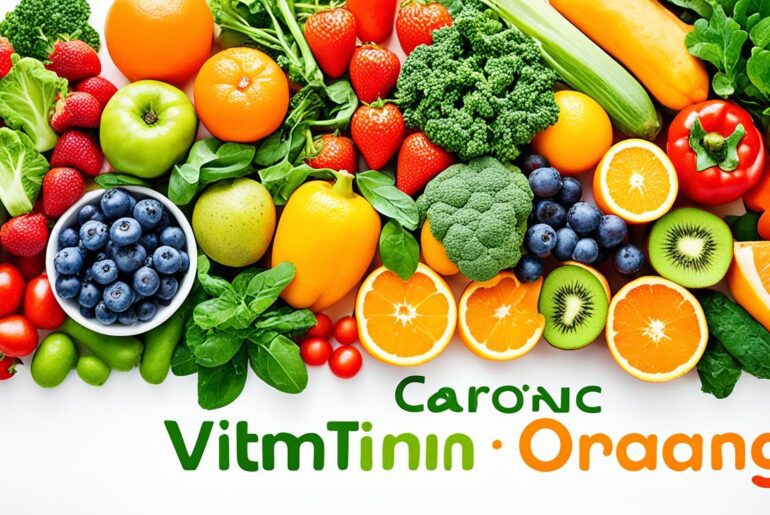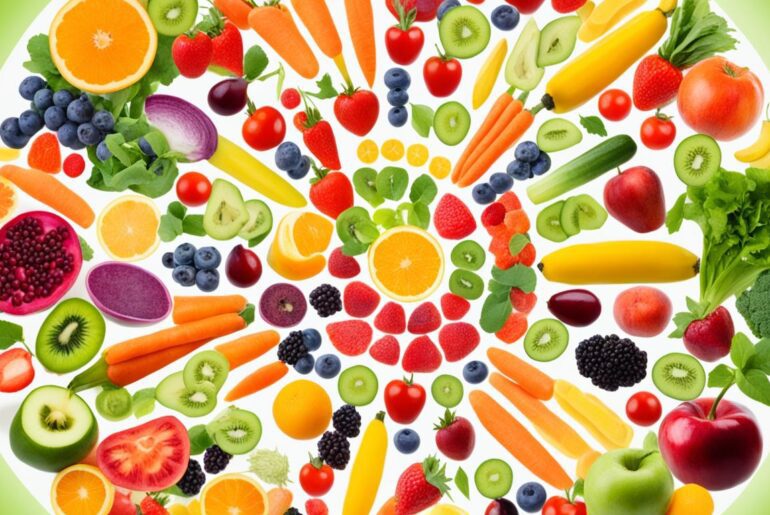Do you dream of achieving radiant, youthful skin? Wondering if there’s a secret formula that can transform your complexion? Look no further! In this article, I will unveil the top essential vitamins for skin rejuvenation. These powerhouse nutrients can work wonders for your skin, promoting a healthy and glowing appearance. So, which vitamins should you be incorporating into your skincare routine? Let’s dive in and find out!
Key Takeaways:
- Essential vitamins play a crucial role in skin rejuvenation and can promote a youthful and glowing complexion.
- Vitamin A, C, E, and K are among the top vitamins for skin rejuvenation due to their various benefits.
- These vitamins support collagen production, regulate sebum production, reduce inflammation, protect against UV damage, and promote overall skin health.
- Along with a nutrient-rich diet, skincare products containing these vitamins can complement the rejuvenation process.
- Sun protection is crucial to prevent sun damage and complement the effects of vitamins on the skin.
The Importance of Nutrients for Healthy Skin
Your skin is the largest organ in your body and plays a crucial role as a protective barrier. To maintain healthy skin, it is essential to provide it with the right balance of nutrients. Nutrients such as vitamins, minerals, and antioxidants are key players in supporting the structure and function of your skin. They contribute to maintaining cell growth, regulating oil production, reducing inflammation, and protecting against UV damage. Incorporating a diet rich in these essential nutrients is vital for skin rejuvenation.
When it comes to achieving healthy skin, a well-rounded diet is of utmost importance. By consuming a variety of nutrient-rich foods, you can ensure that your skin receives the necessary nourishment it requires to thrive. Let’s explore the role of different nutrients in maintaining skin health and rejuvenation:
Vitamins
Vitamins are essential for promoting healthy skin as they contribute to various aspects of skin rejuvenation. They help protect against environmental damage, support collagen production, and enhance the overall health and appearance of your skin.
Minerals
Minerals such as zinc, copper, selenium, and iron are vital for maintaining healthy skin. They contribute to the production of collagen, help regulate oil production, and aid in skin repair and rejuvenation.
Antioxidants
Antioxidants play a crucial role in protecting the skin from free radicals, unstable molecules that can cause damage and premature aging. Foods rich in antioxidants, such as berries, leafy greens, and nuts, can help combat oxidative stress and promote skin health.
Remember, a balanced diet incorporating these essential nutrients is the foundation for healthy skin. However, it’s important to note that skincare products and sun protection also play important roles alongside a nutrient-rich diet. Together, these factors contribute to optimal skin rejuvenation and overall skin health.
Summary
To achieve and maintain healthy skin, it is essential to provide your body with the right balance of nutrients. Vitamins, minerals, and antioxidants all contribute to the structure, function, and rejuvenation of your skin. A well-rounded diet, supplemented with skincare products and sun protection, can help you achieve the healthy, radiant skin you desire.
Vitamin A for Skin Rejuvenation
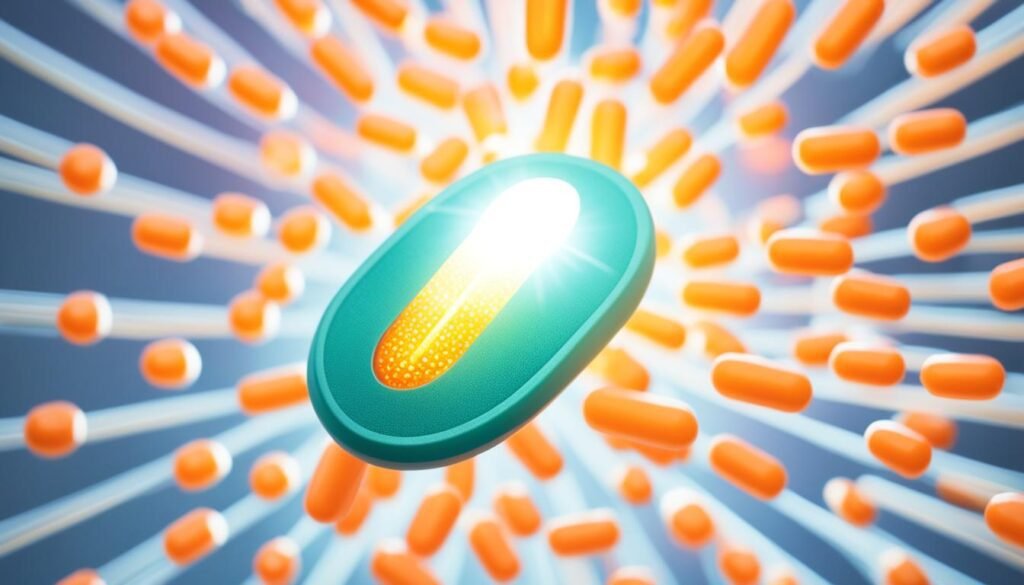
Vitamin A plays a crucial role in rejuvenating your skin and promoting a healthy complexion. Here’s why:
- Vitamin A promotes cell growth and repair, helping to maintain the overall health of your skin.
- It helps regulate sebum production, preventing your skin from becoming too oily or dry.
- Vitamin A has anti-inflammatory properties, reducing redness and irritation.
- Collagen is essential for maintaining the skin’s structure and elasticity. Vitamin A stimulates collagen production, reducing the appearance of wrinkles and fine lines.
- Protect your skin from sun damage by including vitamin A in your diet or skincare routine. It helps improve oil gland function and protect against harmful UV rays.
- Vitamin A aids in the healing process of cuts and scrapes, helping your skin recover faster.
“Vitamin A is a powerful nutrient that can transform your skin, giving it a youthful glow and reducing the signs of aging.” – Dermatologist Dr. Samantha White
Benefits of Vitamin A for Skin
| Benefits | Description |
|---|---|
| Promotes cell growth and repair | Vitamin A helps rejuvenate your skin by promoting the growth and repair of skin cells, resulting in a healthier complexion. |
| Regulates sebum production | By balancing sebum production, vitamin A prevents your skin from becoming too oily or dry, reducing the risk of acne and other skin issues. |
| Reduces inflammation | The anti-inflammatory properties of vitamin A can calm redness and irritation, soothing your skin and improving its overall appearance. |
| Stimulates collagen production | Collagen is essential for maintaining the skin’s elasticity. Vitamin A stimulates collagen production, reducing the appearance of wrinkles and fine lines. |
| Protects against sun damage | Vitamin A helps improve oil gland function and acts as a natural sunscreen, protecting your skin from harmful UV rays. |
| Aids in wound healing | Vitamin A speeds up the healing process of cuts and scrapes, helping your skin recover faster and reducing the risk of scarring. |
Including vitamin A in your diet or using skincare products enriched with this essential nutrient can help rejuvenate your skin and promote a youthful, radiant glow.
Vitamin C for Skin Rejuvenation
Vitamin C is a powerful antioxidant that plays a crucial role in skin rejuvenation. Its benefits for the skin are numerous, making it an essential nutrient to incorporate into your skincare routine.
One of vitamin C’s key functions is its ability to protect the skin from free radical damage caused by environmental factors such as pollution and UV radiation. By neutralizing these harmful free radicals, vitamin C helps prevent premature aging and reduces the risk of sun damage.
Vitamin C also plays a vital role in collagen production, which is essential for maintaining skin elasticity and firmness. Collagen is a protein that provides structure to the skin, and as we age, its production naturally decreases. By increasing collagen synthesis, vitamin C helps improve skin texture, reduce the appearance of wrinkles, and promote a more youthful complexion.
Additionally, vitamin C has brightening properties that can help even out skin tone and reduce the appearance of dark spots and hyperpigmentation. It inhibits the production of melanin, the pigment responsible for dark spots, thereby promoting a more radiant complexion.
Another significant benefit of vitamin C is its ability to enhance the effectiveness of sunscreens. When used in conjunction with a broad-spectrum sunscreen, vitamin C can provide an additional layer of protection against UV radiation, helping to prevent sunburn and long-term sun damage.
| Benefits of Vitamin C for Skin Rejuvenation |
|---|
| Protects the skin from free radical damage |
| Boosts collagen production for increased skin elasticity |
| Brightens the skin complexion and reduces dark spots |
| Enhances the effectiveness of sunscreens |
To incorporate vitamin C into your skincare routine, you can use topical products such as serums and moisturizers that contain this potent antioxidant. Look for skincare products with a high concentration of vitamin C and choose stable formulations to ensure maximum effectiveness.
Alternatively, you can also consume foods rich in vitamin C or take oral supplements to reap the benefits internally. Citrus fruits, berries, kiwi, and leafy greens are excellent dietary sources of vitamin C.
Remember, consistency is key when incorporating vitamin C into your skincare routine. Use products or consume vitamin C regularly to experience its full range of benefits and achieve optimal skin rejuvenation.
Expert Insight: The Role of Vitamin C in Skincare
“Vitamin C is an essential antioxidant in skincare. It protects the skin from damage caused by free radicals and stimulates collagen synthesis, resulting in firmer, smoother, and more youthful-looking skin. Additionally, vitamin C has brightening properties that help improve skin tone and reduce hyperpigmentation. It’s a must-have ingredient for anyone looking to achieve healthy and rejuvenated skin.” – Dr. Julia Adams, Dermatologist
Vitamin E for Skin Rejuvenation
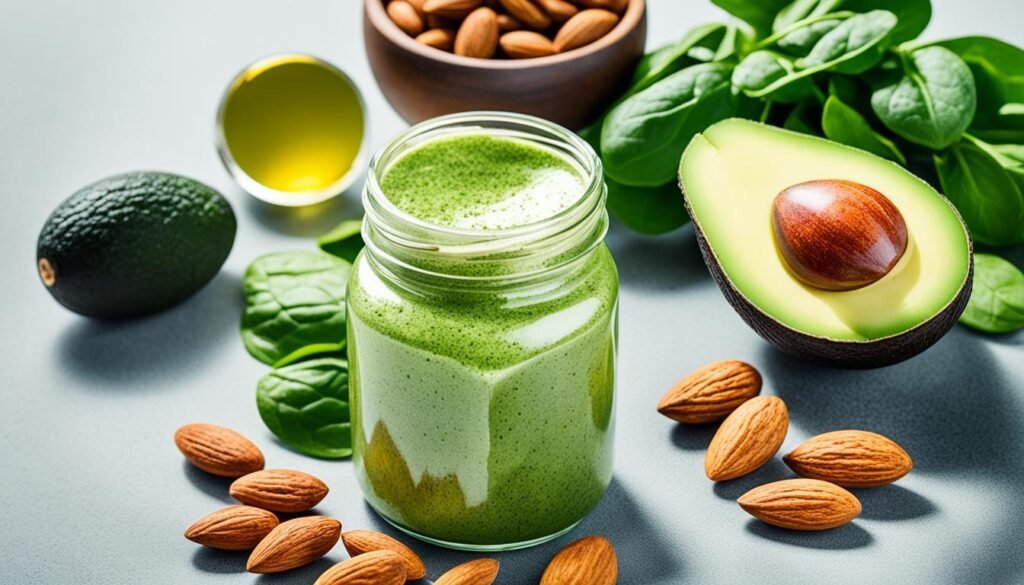
Vitamin E is a powerhouse antioxidant that works wonders for your skin. Its benefits for skin rejuvenation are numerous, making it a must-have ingredient in your skincare routine. Whether applied topically or included in your diet, vitamin E can significantly improve the health and appearance of your skin.
One of the primary benefits of vitamin E for skin is its ability to protect against sun damage and environmental stressors. The antioxidant properties of vitamin E help neutralize harmful free radicals and prevent premature aging, such as fine lines, wrinkles, and age spots. By shielding your skin from these damaging factors, vitamin E promotes a youthful and radiant complexion.
Vitamin E also plays a vital role in hydration and moisturization. It helps improve the skin’s ability to retain moisture, reducing dryness and promoting a soft and supple texture. Regular use of vitamin E can diminish the appearance of fine lines and wrinkles, giving your skin a smoother and more youthful appearance.
In addition to its moisturizing effects, vitamin E supports the skin’s natural healing process. It reduces inflammation and redness, making it ideal for those with sensitive or irritated skin. Whether you have a sunburn, a minor cut, or skin irritation, vitamin E can help soothe and heal the skin, restoring its health and vitality.
It’s important to note that while applying vitamin E topically can provide direct benefits to the skin, including vitamin E-rich foods in your diet can further enhance its effects. A balanced diet with foods like almonds, spinach, avocados, and sunflower seeds can boost your vitamin E intake and promote overall skin health.
To summarize, the benefits of vitamin E for skin rejuvenation are significant. Its antioxidant properties protect the skin, while its moisturizing and healing capabilities promote a youthful and healthy complexion. Whether through topical application or dietary consumption, incorporating vitamin E into your skincare routine is a natural and effective way to enhance your skin’s health and radiance.
Vitamin D for Skin Rejuvenation
When it comes to skin rejuvenation, vitamin D plays a vital role in promoting healthy and vibrant skin. Additionally, it offers numerous benefits, including regulating sebum production, supporting the immune system, and contributing to cell growth and repair. Adequate levels of vitamin D can reduce the risk of skin conditions like psoriasis and enhance overall skin health.
One of the primary sources of vitamin D is sunlight. Spending time outdoors and allowing your skin to soak up the sun’s rays can naturally synthesize this essential nutrient. However, it’s important to strike a balance and practice sun safety by wearing sunscreen and seeking shade to prevent harmful UV damage.
If you live in areas with limited sunlight or have difficulty getting enough sun exposure, you can obtain vitamin D from dietary sources such as fortified foods or through supplements. Incorporating these sources into your daily routine can ensure you maintain optimal vitamin D levels for skin rejuvenation.
In summary, vitamin D is a crucial component in skin rejuvenation. Its role in regulating sebum production, supporting the immune system, and contributing to cell growth and repair makes it an essential nutrient for maintaining healthy, glowing skin.
Vitamin K for Skin Rejuvenation
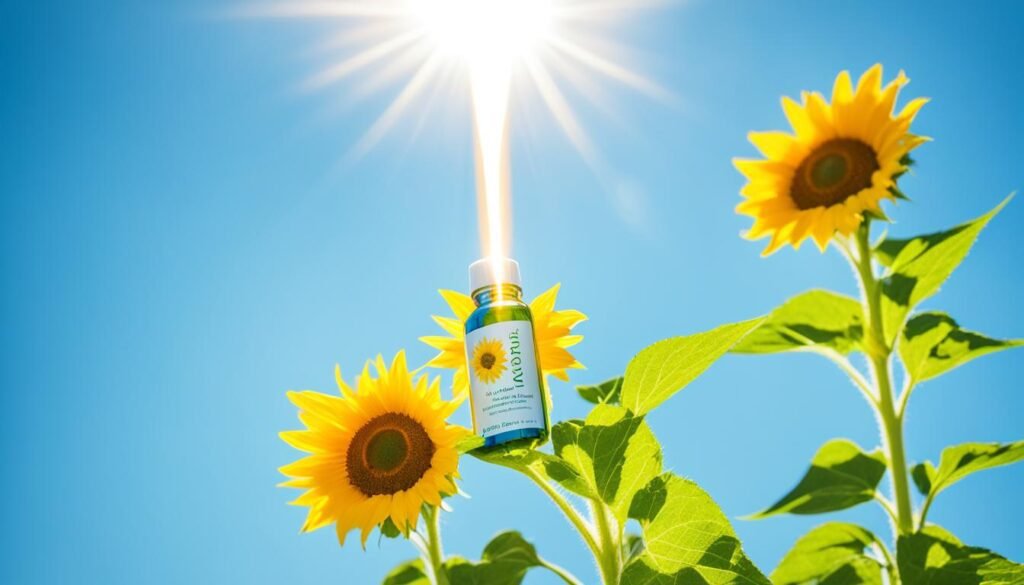
Vitamin K plays a significant role in skin rejuvenation by aiding the body’s blood clotting process and offering several benefits for the skin. Let’s explore the benefits and the role of vitamin K in promoting a healthy and radiant complexion.
Benefits of Vitamin K for Skin
- Reduces the appearance of dark circles: Vitamin K helps diminish the appearance of dark circles under the eyes, providing a more refreshed and youthful look.
- Minimizes bruising: Applying vitamin K topically can help reduce the visibility of bruises by promoting faster healing.
- Improves skin redness: Vitamin K has anti-inflammatory properties that can help reduce skin redness and irritation, making it beneficial for individuals with sensitive skin or conditions like rosacea.
The Role of Vitamin K in Skin Rejuvenation
Vitamin K strengthens the blood vessels and capillaries in the skin, preventing blood leakage and subsequent skin discoloration. By improving blood circulation, it promotes a healthier skin tone and reduces the appearance of unwanted redness or uneven patches.
To further understand the role of vitamin K in skin rejuvenation, let’s take a closer look at how it works:
- Boosts collagen production: Vitamin K helps in the synthesis of collagen, a protein responsible for maintaining the skin’s elasticity and firmness. By promoting collagen production, it contributes to reducing the appearance of fine lines and wrinkles.
- Enhances the healing process: Topical application of vitamin K aids in the healing of skin wounds, cuts, and scrapes. It promotes cell regeneration and accelerates the repair of damaged skin, fostering a more youthful complexion.
- Calms skin inflammation: Vitamin K’s anti-inflammatory properties help soothe and calm irritated skin, making it an excellent ingredient for individuals with sensitive or reactive skin types.
Vitamin K can be found in both topical creams and various dietary sources. Including vitamin K-rich foods like leafy greens (spinach, kale) and broccoli in your diet is an excellent way to obtain this beneficial nutrient for skin rejuvenation.
Other Essential Micronutrients for Skin Rejuvenation
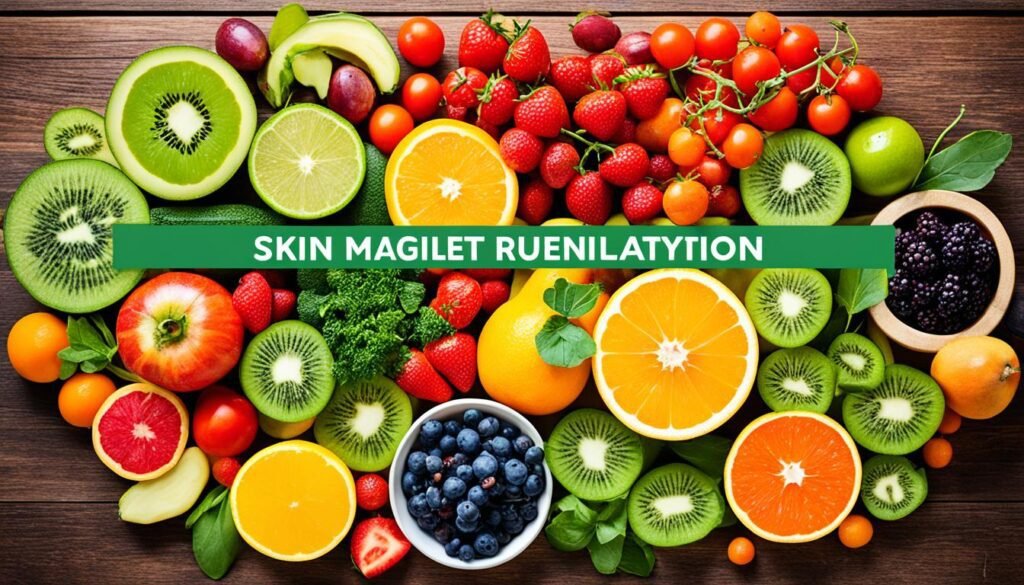
In addition to vitamins, there are other essential micronutrients that play a crucial role in skin rejuvenation. These micronutrients include minerals like zinc, copper, selenium, iron, and antioxidants like biotin, niacin, pantothenic acid, magnesium, manganese, and omega-3 fatty acids. Incorporating these micronutrients into your diet can provide numerous benefits for your skin health.
Minerals such as zinc, copper, and selenium are important for maintaining the structure and integrity of the skin. They contribute to collagen formation, which helps keep the skin firm and supple. These minerals also have antioxidant properties that protect the skin from free radical damage and reduce inflammation.
The inclusion of iron in your diet is essential for maintaining healthy skin. Iron helps deliver oxygen to the skin cells, promoting a radiant complexion and preventing dullness. It also aids in the production of collagen and supports the skin’s natural healing process.
Antioxidants like biotin, niacin, and pantothenic acid play a vital role in skin rejuvenation. Biotin helps strengthen the skin’s protective barrier and improves its overall health. Niacin has anti-inflammatory properties that can calm irritated skin and reduce redness, while pantothenic acid promotes skin hydration and helps in the repair process.
Magnesium and manganese are also essential micronutrients for skin rejuvenation. Magnesium has anti-inflammatory properties and helps regulate sebum production, preventing clogged pores and blemishes. Manganese supports collagen production and plays a role in maintaining the skin’s elasticity.
The omega-3 fatty acids found in foods like fatty fish, flaxseeds, and walnuts are beneficial for skin health. They reduce inflammation, hydrate the skin, and promote a smoother complexion. Omega-3 fatty acids also help strengthen the skin’s protective barrier, preventing moisture loss and improving overall skin texture.
Including a variety of nutrient-rich foods in your diet is crucial for providing your skin with all the necessary micronutrients it needs for optimal rejuvenation. Incorporate foods like leafy greens, seafood, nuts, seeds, whole grains, and fruits rich in antioxidants to support your skin health.
By integrating these essential micronutrients into your diet, you can enhance your skin rejuvenation efforts and achieve healthy, glowing skin.
| Micronutrient | Role in Skin Rejuvenation | Main Food Sources |
|---|---|---|
| Zinc | Supports collagen formation, protects against free radicals, reduces inflammation | Shellfish, lean meats, legumes, nuts, seeds |
| Copper | Aids collagen production, maintains skin elasticity, provides antioxidant protection | Organ meats, seafood, nuts, seeds, whole grains |
| Selenium | Protects against oxidative stress, supports tissue elasticity, reduces inflammation | Brazil nuts, seafood, organ meats, whole grains |
| Iron | Delivers oxygen to the skin, promotes a radiant complexion, aids collagen production | Lean meats, poultry, fish, beans, spinach, fortified cereals |
| Biotin | Strengthens the skin’s protective barrier, improves overall skin health | Eggs, nuts, seeds, fish, whole grains |
| Niacin | Reduces inflammation, calms irritated skin, improves skin tone | Poultry, fish, peanuts, mushrooms, green peas |
| Pantothenic Acid | Supports skin hydration, aids in the repair process | Meat, poultry, fish, whole grains, avocados |
| Magnesium | Reduces inflammation, regulates sebum production, promotes clearer skin | Leafy greens, nuts, seeds, whole grains, legumes |
| Manganese | Supports collagen production, maintains skin elasticity | Nuts, seeds, whole grains, legumes |
| Omega-3 Fatty Acids | Reduces inflammation, hydrates the skin, promotes smoother complexion | Fatty fish, flaxseeds, chia seeds, walnuts, soybeans |
The Role of Skincare Products
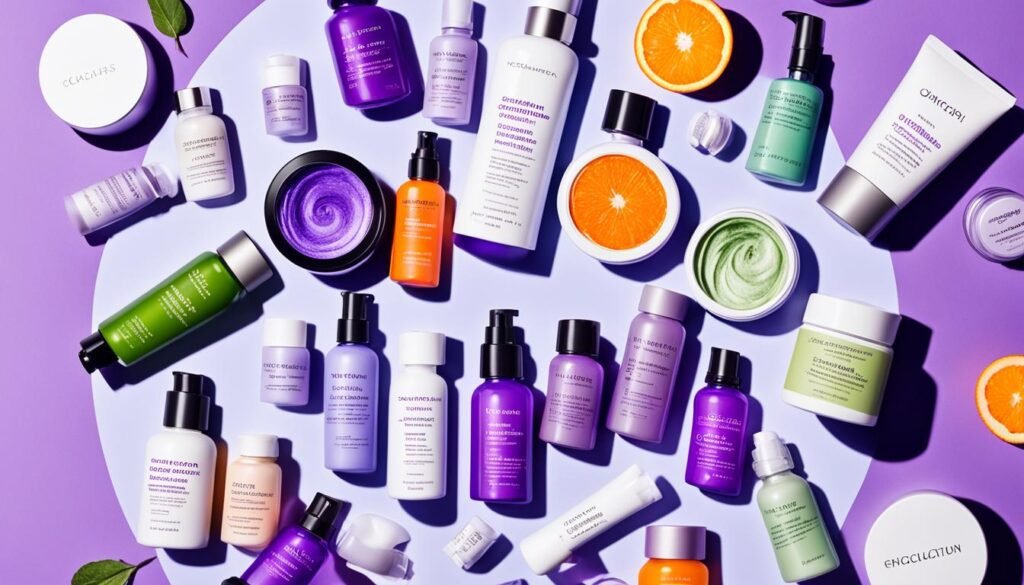
Alongside a nutrient-rich diet, skincare products play a crucial role in complementing the skin rejuvenation process. Through topical application, these products provide targeted nourishment and deliver essential vitamins and beneficial ingredients directly to the skin, promoting its health and vitality. Many skincare products are formulated with key vitamins, including vitamin A, C, E, and K, along with other antioxidants and hydrating components.
These skincare products offer a range of benefits to improve skin texture, reduce signs of aging, and enhance overall skin health. By incorporating them into your daily skincare routine consistently and as directed, you can effectively rejuvenate your skin and achieve desired results.
Topical Application for Skin Health
The topical application allows the active ingredients in skincare products to penetrate the skin layers and provide targeted benefits to address specific concerns. When applied regularly, these products can significantly contribute to the rejuvenation of your skin, providing nourishment, hydration, and protection against environmental stressors.
Skincare products designed for skin rejuvenation often contain vitamins A, C, E, and K, which are known for their skin-boosting properties. These vitamins help stimulate collagen production, improve skin elasticity, reduce the appearance of wrinkles and fine lines, and promote a youthful complexion.
The Role of Skincare in Rejuvenating the Skin
Skincare products act as a supplement to your diet, reinforcing the effects of essential nutrients and vitamins needed for skin rejuvenation. They offer concentrated doses of active ingredients, allowing you to target specific skin concerns and tailor your skincare routine to your individual needs.
The inclusion of antioxidants in skincare products helps neutralize free radicals, which are harmful molecules that contribute to premature aging and skin damage. By providing your skin with these antioxidants, you can protect it from oxidative stress and maintain its youthful appearance.
In addition to delivering vitamins and antioxidants, skincare products also offer hydration and moisture retention, promoting a healthy skin barrier function. This can improve overall skin health and radiance, leaving your skin feeling soft, supple, and nourished.
When choosing skincare products, it is important to consider your skin type, concerns, and preferences. Look for products that are suitable for your specific needs and formulated with high-quality ingredients. Incorporating these products into your skincare routine, alongside a nutrient-rich diet, can amplify the effects of skin rejuvenation and help you achieve your desired skin goals.
The Importance of Sun Protection
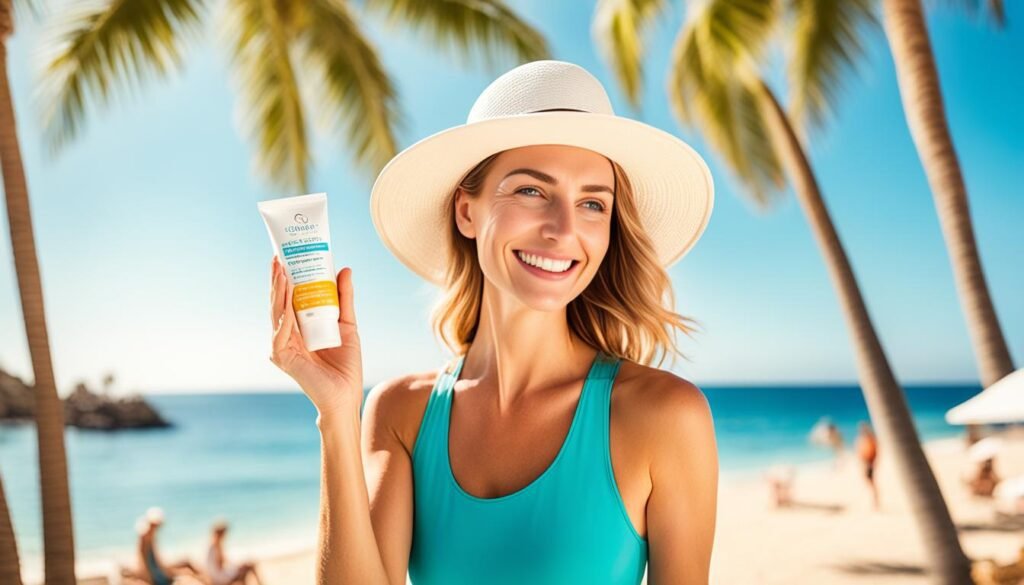
To maintain healthy and youthful-looking skin, it is crucial to protect it from sun damage. UV rays can cause premature aging, wrinkles, dark spots, and increase the risk of skin cancer. Regularly applying broad-spectrum sunscreen with at least SPF 30, seeking shade, and wearing protective clothing can help prevent sun damage. Sun protection is essential to complement the effects of vitamins and promote optimal skin rejuvenation.
Consult a Healthcare Professional

When it comes to the health and rejuvenation of your skin, consulting a healthcare professional is essential. Dermatologists and nutritionists are experts in skin health and can provide personalized skincare recommendations tailored to your specific needs. They have the knowledge and experience to assess any underlying skin conditions you may have and offer guidance on the most effective ways to rejuvenate your skin.
By seeking professional advice, you can optimize the results of your skincare routine and ensure the safe and effective application of vitamins for skin rejuvenation. Healthcare professionals can evaluate your diet, skincare products, and lifestyle habits to determine the best course of action for achieving healthier, more youthful skin.
One of the major benefits of consulting a professional is receiving personalized skincare recommendations. They take into consideration factors such as your skin type, age, lifestyle, and any existing skin concerns to create a customized plan specifically tailored for you. This personalized approach ensures that you are using the right products and techniques to address your unique skin needs, maximizing the benefits and minimizing the risk of adverse reactions.
“Consulting a healthcare professional for personalized skincare recommendations can make a significant difference in the effectiveness of your skincare routine.”
Furthermore, professional advice goes beyond just skincare products. Healthcare professionals can also provide guidance on dietary changes that can promote skin health and rejuvenation. They can recommend specific foods and nutrients that are beneficial for your skin, helping you achieve a radiant complexion from the inside out.
Remember, your skin is unique, and what works for others may not work for you. Consulting a healthcare professional ensures that you are receiving expert advice tailored to your individual needs, increasing the chances of achieving desirable results. Whether it’s choosing the right skincare products, implementing a proper skincare routine, or making dietary adjustments, their guidance can be instrumental in your journey towards healthier, more youthful skin.
Conclusion
Achieving healthy and rejuvenated skin requires a holistic approach. Essential vitamins, such as vitamin A, C, E, and K, along with other micronutrients, play a crucial role in skin rejuvenation. By including these vitamins in your diet and skincare routine, you can promote a youthful and glowing complexion.
A balanced diet rich in nutrient-dense foods provides your skin with the necessary building blocks for optimal health and rejuvenation. Additionally, incorporating skincare products that contain these vitamins can provide targeted nourishment and enhance the effects of your regimen.
It is equally important to protect your skin from sun damage. Regularly applying sunscreen, seeking shade, and wearing protective clothing can help prevent premature aging, dark spots, and minimize the risk of skin cancer.
For personalized skincare recommendations and guidance, consult a healthcare professional such as a dermatologist or nutritionist. They can assess your specific needs and underlying skin conditions and provide expert advice to maximize the benefits of essential vitamins for skin rejuvenation.
FAQ
What are the top essential vitamins for skin rejuvenation?
The top essential vitamins for skin rejuvenation include vitamin A, vitamin C, vitamin E, vitamin D, and vitamin K. These vitamins play a crucial role in promoting healthy skin, reducing signs of aging, and improving overall skin health.
What is the importance of nutrients for healthy skin?
Nutrients such as vitamins, minerals, and antioxidants are essential for maintaining healthy skin. They support cell growth, regulate oil production, reduce inflammation, and protect against UV damage. Including these nutrients in your diet can have significant benefits for your skin rejuvenation.
How does vitamin A contribute to skin rejuvenation?
Vitamin A promotes cell growth and repair, regulates sebum production, and has anti-inflammatory properties. It plays a vital role in collagen production, protects against sun damage, improves oil gland function, and aids in the healing of cuts and scrapes.
What benefits does vitamin C have for skin rejuvenation?
Vitamin C is a powerful antioxidant that protects the skin from free radical damage. It boosts collagen production, brightens the skin complexion, reduces the appearance of dark spots, improves skin texture, and enhances the effectiveness of sunscreens.
How does vitamin E contribute to skin rejuvenation?
Vitamin E is a potent antioxidant that protects the skin from sun damage and environmental stressors. It hydrates and moisturizes the skin, reduces the appearance of fine lines and wrinkles, supports the skin’s natural healing process, and promotes overall skin health.
What role does vitamin D play in skin rejuvenation?
Vitamin D contributes to skin cell growth and repair, regulates sebum production, and supports the skin’s immune system. Adequate vitamin D levels may reduce the risk of certain skin conditions, promote healthy cell differentiation, and contribute to overall skin health.
How does vitamin K benefit skin rejuvenation?
Vitamin K aids in the body’s blood clotting process and can help reduce the appearance of dark circles, bruising, and skin redness. It strengthens blood vessels and capillaries, preventing blood leakage and skin discoloration. Vitamin K also has anti-inflammatory properties that can reduce skin redness and irritation.
What other essential micronutrients are important for skin rejuvenation?
In addition to vitamins, minerals like zinc, copper, selenium, and iron, as well as antioxidants like biotin, niacin, pantothenic acid, magnesium, manganese, and omega-3 fatty acids, play a crucial role in skin rejuvenation. They support skin cell growth, regulate oil production, reduce inflammation, and protect against free radicals.
How do skincare products contribute to skin rejuvenation?
Skincare products containing vitamins A, C, E, K, and other beneficial ingredients provide targeted nourishment to the skin. These products can improve skin texture, reduce signs of aging, and enhance overall skin health when used consistently and as directed.
How important is sun protection for skin rejuvenation?
Sun protection is crucial for complementing the effects of vitamins and promoting optimal skin rejuvenation. UV rays can cause premature aging, wrinkles, dark spots, and increase the risk of skin cancer. Regularly applying sunscreen, seeking shade, and wearing protective clothing can help prevent sun damage.
Why is it important to consult a healthcare professional for skin rejuvenation?
Consulting a healthcare professional, such as a dermatologist or nutritionist, can provide personalized skincare recommendations. They can evaluate your specific needs, assess any underlying skin conditions, and offer guidance on the most effective ways to rejuvenate your skin through diet, skincare products, and lifestyle changes.

